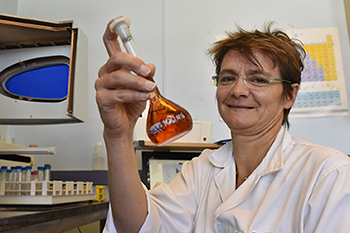Latest News Archive
Please select Category, Year, and then Month to display items
28 October 2024
|
Story Zingaphi Mdletshe
|
Photo Supplied
 Kovsie ACT volunteers undergo leadership and skills training, preparing them to engage in community service and develop sustainable solutions to societal challenges beyond university life.
Kovsie ACT volunteers undergo leadership and skills training, preparing them to engage in community service and develop sustainable solutions to societal challenges beyond university life.
The University of the Free State’s (UFS) Kovsie ACT office continues to foster a spirit of humanity among students through a leadership and skills development training initiative that is aimed at not only developing them as volunteers but also as conscientious individuals who understand the value of helping others.
“The leadership and skills development training is a platform that the ACT office utilises to ensure that volunteers are equipped with the necessary skills needed to fulfil their duties as Central ACT Committee members, thereby facilitating a smooth term,” said Teddy Sibiya, Senior Assistant Officer at Kovsie Support Services. “We aim to impart knowledge that will be beneficial during their term and beyond their involvement with the ACT office.”
Touching on how the training aligns with the broader goals of the Kovsie ACT Volunteer Programme for the term 2024/2025, Sibiya emphasised that sustainability has always been at the heart of Kovsie ACT and that their activities provide opportunities for students to engage in community service and participate in environmental initiatives to assist civil society organisations. The programme also encourages students to become active global citizens by addressing transnational issues such as food insecurity and socio-economic challenges.
“I am excited about the opportunity to be part of a movement that influences not just the lives of students but also reaches beyond the university, promoting innovative and sustainable solutions on a larger scale,” said Raylene Bussack, a Central ACT Committee volunteer. “My goal is to inspire and empower others to join us in this vital work to make a lasting difference together.”
In addition to leadership training, Kovsie ACT offers various programmes designed to enhance students' skills in areas such as communication, teamwork and project management. These skills are essential for their roles within Kovsie ACT and for their future careers. By participating in community service projects, students build valuable relationships and gain practical experience that will benefit them upon graduation. The initiative ultimately aims to create a culture of giving back among students while enriching their university experience.
UFS Ground Studies Laboratory receives accreditation to international standard
2016-03-18

Lore-Mari Deysel, Deputy-Director of the institute for Groundwater Studies.
Photo: Charl Devenish |
The Institute for Groundwater Studies (IGS) Laboratory at the University of the Free State is on equal footing with international testing labs. With its accreditation in March 2016 by SANAS (South African National Accreditation System), the IGS Laboratory now officially meets global standards.
Quality of water
The IGS Laboratory mainly analyses the quality of water samples. When it was originally established in 1989, the lab’s central function was to conduct testing for researchers at the institute itself. “After the public and water boards realised their need to analyse water samples, the IGS Laboratory expanded to deliver a service to these clients,” says Lore-Mari Deysel, Deputy-Director of the institute.
Since suppliers and regulatory authorities will not accept test or calibration results from a lab that is not accredited, the IGS initiated the accreditation process.
Accreditation to international standard
In order to be deemed technically competent and able to receive accreditation, labs must meet the ISO/IEC 17025 standard. ISO/IEC 17025 was first issued in 1999 by the ISO (International Organization for Standardization) and the IEC (International Electrotechnical Commission).According to Deysel, this is the single most important standard for calibration and testing laboratories around the world.
“Laboratories that are accredited to this international standard have demonstrated that they are technically competent and able to produce precise and accurate test and/or calibration data. Furthermore, it demonstrates that the university has the capacity to supply valuable and reliable services alongside the academy,” Deysel says.